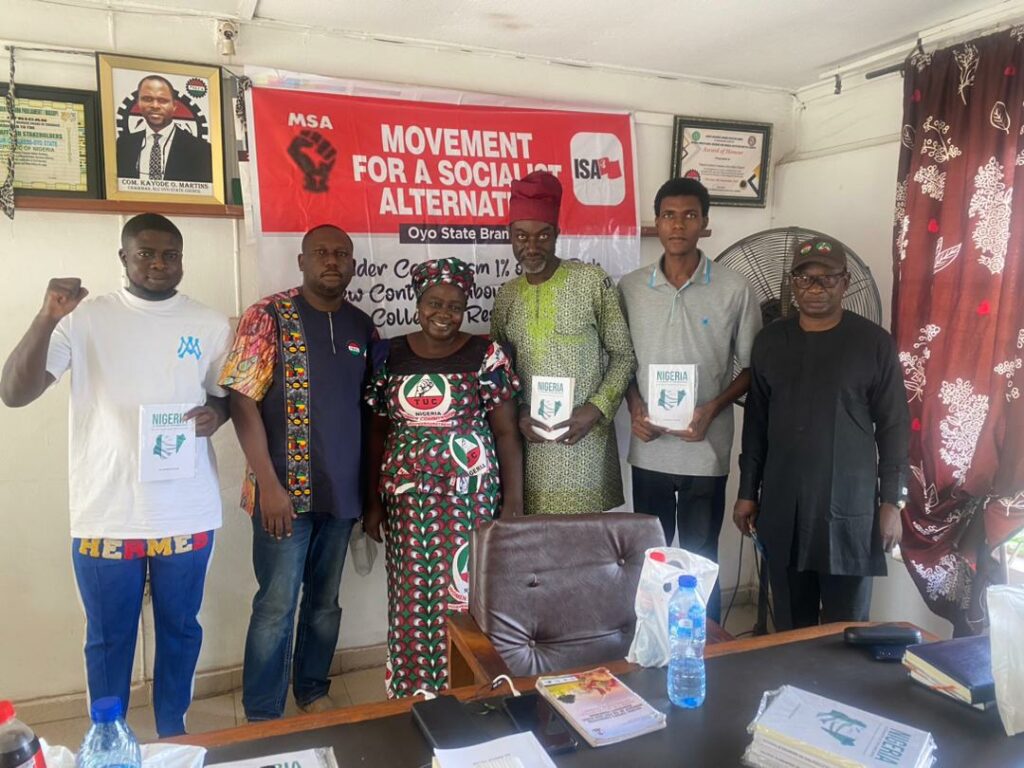OYO STATE BRANCH OF THE MSA HELD A BOOK PRESENTATION:
Nigeria: A Country at the Precipice, Ruling Class or Working Class to the Rescue?
By Seyi Lasisi
The Oyo state branch of the Movement for a Socialist Alternative MSA organises a symposium to present the book written by the General Secretary of the MSA, comrade Aj. Dagga Tolar. The symposium, held on Saturday, July 22, 2023, at the NLC Oyo State Labour House, had a quality discussion around the book titled Nigeria: A Country at the Precipice, Ruling Class or Working Class to the Rescue?

Moreover, the meeting started behind the scheduled time due to heavy rain that lasted several hours, but the book presentation was a success. As it was stressed during the discussion, it’s not about the large number of comrades that made it to the meeting but the quality of the discussion that was held.
The discussion around the book is important in a period where there is an increasing attack on the living standards of the country’s working people with a hike in fuel price as well as the anti-working-class increment in tuition fees of universities in the country (UNILAG being a recent example).
While giving the author’s remark, Comrade Dagga Tolar, in his discussion, began on the state of health care in the country and the prolific maternity death in the country. The ruin in health care has seen women losing their lives during childbirth, and when child delivery is successful, hospital bills often make the husband run away.
Dagga made referenced Obafemi Awolowo’s Social democratic initiative during his rule. Although not a well-rounded Socialist government, it did indicate what is possible under a socialist government. Historically, the collapse of the Soviet Union made governments with subtle affiliation to Socialist-incline ideologies outright right-wing in the ruling of their country. What is the global state of the economy? Comrade Dagga extensively explained China’s imperialist govt and its emergence in the world. What is the state of the Labour movement? Can a trade union become a political party? These are some questions that Dagga, in his short but detailed discussion, gave scientific answers to. He also mentioned that documented history hasn’t been fair to the worker’s role in the collapse of colonialism, military dictatorship, and the June 12 Protest. The lessons learned during these historical and political movement show, as socialists have always reiterated, that it is only the working class that the ruling class is afraid of. And the working class remains the only one against the ruling elites. Although the working class lacks the philosophical and scientific basis for challenging the capitalist idea, it’s the only class that can save itself.
On contribution, Comrade Ranti Gbenle-Oluwemimo, the Vice Chairperson of the Trade Union Congress TUC, Oyo State, commended the author for the timely issues it raises and the positions taken. The comrade furthers her contribution by stating that women are always at the receiving end of society. Another important point she raised in her contribution is the death of the former Oyo state Governor during the COVID-19 Pandemic. The death of the former Governor is linked to the lack of health facilities in the state and the travelling constraint during the COVID-19 period.
The Special Adviser to the Gov. on Labour Matters, Comrade Bayo Titilola-Sodo, began his contribution by saying conversations of this nature are important attempts to rekindle the old path of vigorous debate on issues. He furthered his comment by saying leadership, at various levels, has become compromised. And there is a noticeable dwindling of people canvassing for socialist transformation. He ended his comment by asking for unity between the left organisations in the country.
The Secretary of NLC Oyo State Council, Comrade Fabunmi, began by saying that it is not that labour leaders are gullible or weak. Economic situations and the need for survival are issues facing leaders, making them sway their commitment level to the working-class cause.
A total of 18 copies of the book were bought at the end of the discussion with solidarity songs to close the symposium.
